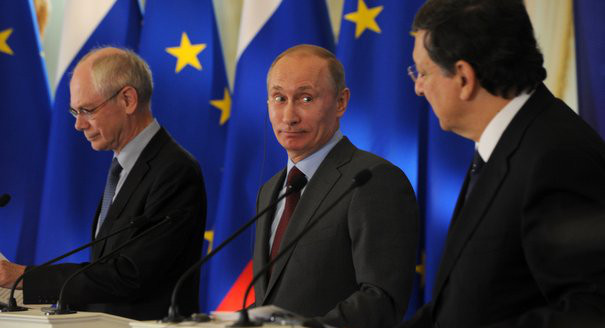Russia and the European Union have never admitted that they have a problem. Unlike NATO, the EU has no history of hostility with Moscow. Economic integration and good neighborly relations are hard to dislike. In line with some Americans, much of the Russian elite regard Brussels with faint contempt: a project built on renouncing force and sharing sovereignty does simply not fit the Russian world-view.
Now confrontation of some kind looks inevitable. The issue, of course, is the struggle for the soul—or at least the political-economic model—of Ukraine, and to a greater or lesser degree, the other five Eastern European countries of the so-called Eastern Partnership.
At the Eastern Partnership summit in Vilnius in November, the Ukrainians are likely to be offered an EU Association Agreement and the prospect of deeper European economic integration. But there will be strings attached—one of which is that the government in Kiev will be told that the deal is incompatible with Vladimir Putin’s Eurasian Customs Union. Armenia is facing the same dilemma on a smaller scale.
Meanwhile, fully aware that Ukraine is the central missing piece to his biggest foreign policy project, Putin is deploying all kinds of threats and blandishments with Ukraine. The big celebrations to mark the 1025th anniversary of the baptism of Kievan Rus, with the presence of Patriarch Kirill, was the kind of big occasion a Brussels bureaucrat could never dream of staging.
To put it another way, “Russians are from Mars, Europeans are from Venus.” Despite the similarity of their names, the European Union and the Eurasian Union are fundamentally different projects, one based on pooling sovereignty, the other on reasserting Moscow’s economic primacy in its neighborhood.
We will see this clash described and evaluated in plenty of detail between now and November.
For the moment, I have a different question: Can Brussels and Moscow find a way to talk about their differences or do they simply lack the means and the vocabulary to do so? The basic choice Ukraine and Armenia face is stark: it will be hard for them to pursue full EU economic integration, while also joining the Customs Union.
But there is a long way to travel until then, and in the meantime there will be issues that the East Europeans want to discuss with both sides. An obvious one is visas. Ukrainians want open borders with both Russia and the EU. Can the two sides find a way of talking the same language on issues like this?
